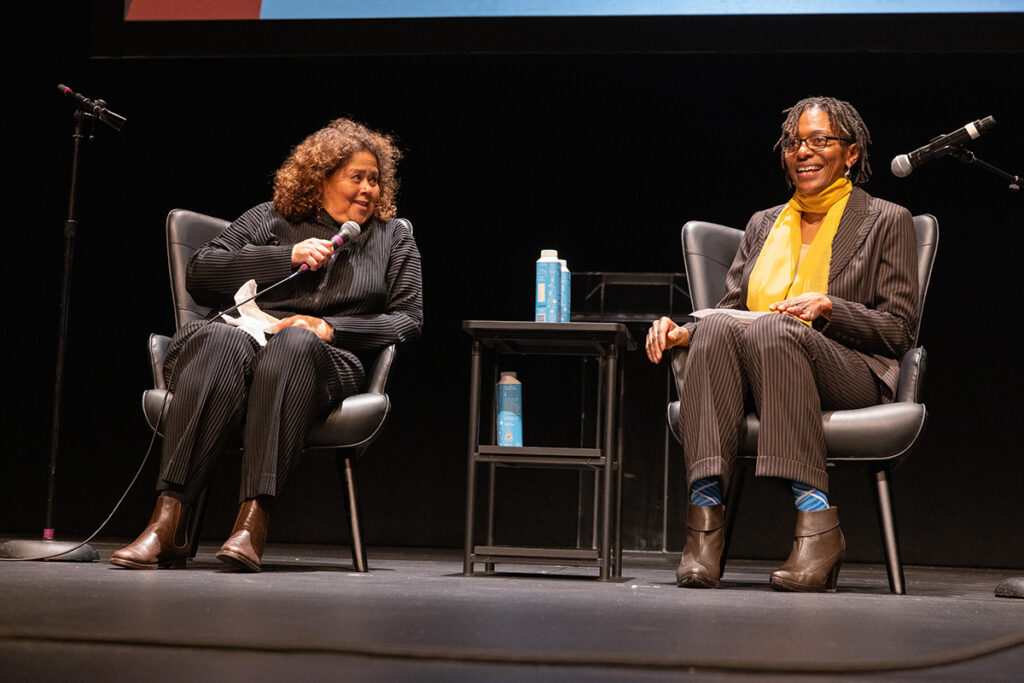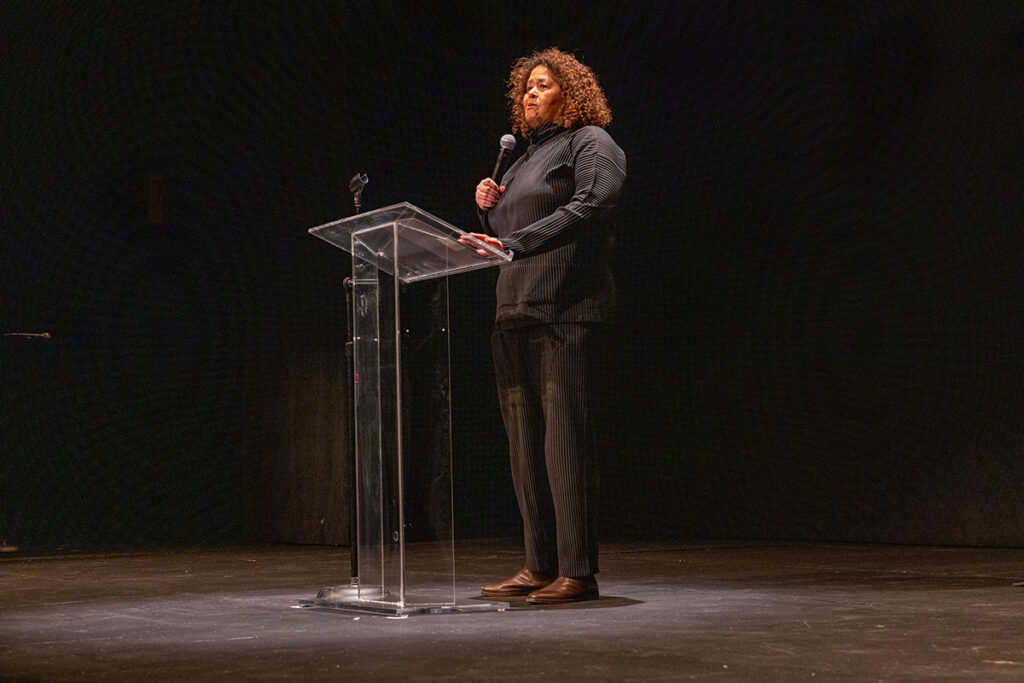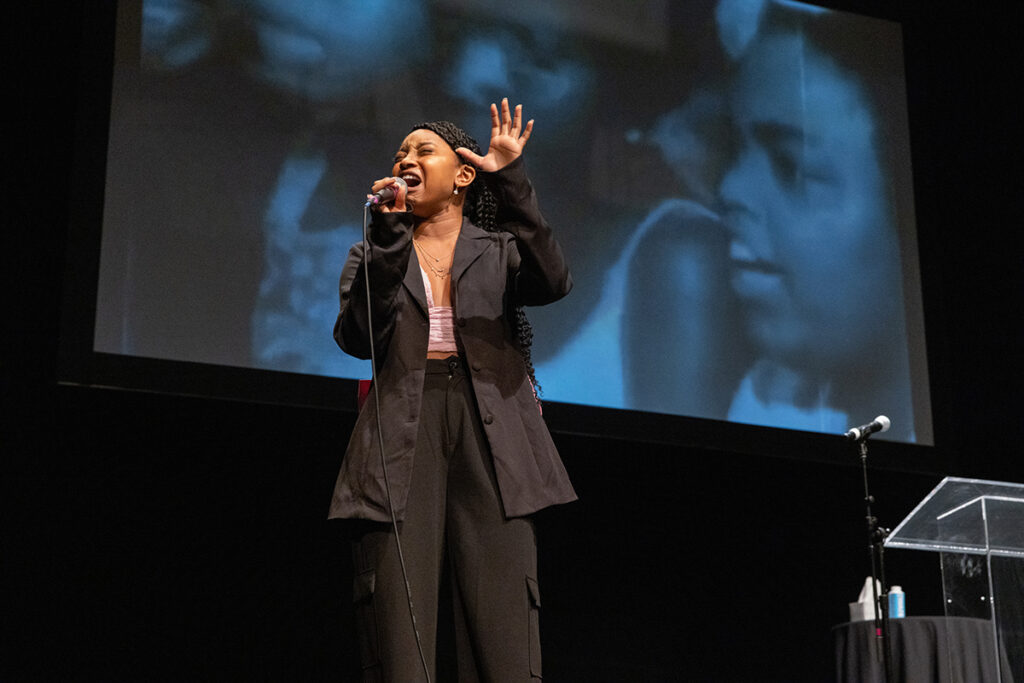Anna Deavere Smith: The Power of Listening, Engaging

Anna Deavere Smith has been listening to people for nearly five decades.
The playwright, actor, and educator demonstrated her skill in that area to Emerson students, faculty, staff, and guests on Friday, February 17, when she gave the keynote for the 2023 Teach-In on Race, with the theme “Teaching Truthfully About Race and Racism in the Academy.”
Smith blended a traditional talk with theatrical “portraits” – brief, verbatim portrayals of real people with whom she’s recorded interviews – a technique that she put to great effect in her Obie Award-winning play, Notes from the Field, about the school-to-prison pipeline, and which won her a MacArthur “Genius” Fellowship.
“It dawned on me very early, back then as a student, that to develop a voice … you have to have an ear, and so that’s what I’ve been doing is listening to America for a very long time,” Smith told the audience.
Smith said as a young dramatist in the 1970s, she set out to answer the question, “Is there a relationship of language to identity?” by interviewing countless Americans.
“I didn’t find the answer, and I didn’t find America, but I have been occupied for a long time trying to do that, so it’s kept me engaged,” she said. “And I think engagement is really what’s essential when we think about racism, and when we think about it in the academy.”
As the direct descendent of a medieval institution, the academy is intensely hierarchical, a fact that gets in the way of addressing racism as a moral issue, Smith said.
Orson Welles allegedly would place pieces of tape at intervals along the floor, and your status within Hollywood determined from which piece of tape you could talk to the director, said Smith, a professor at New York University. Higher education has its own equivalent of pieces of tape on the floor, and they determine who gets heard and by whom.
“So we make it a moral conversation of justice and what should be, but what I want to tell you is that if you cannot negotiate beyond those lines, you will always feel that something’s not just.”

Smith called her interview work “an I/Thou project,” referring to Jewish philosopher Martin Buber’s “I/Thou” idea, that we can relate to other people as humans or as things. She brought five of her “portraits” to the Cutler Majestic Theatre last Friday, three of which were interviews for Notes from the Field:
Kevin Moore, a witness who filmed Freddie Gray’s killing by Baltimore Police in 2015, spoke of the importance of the Black community being “armed” with phone cameras to protect themselves. Stephanie Williams, an “emotional support teacher” at Huey Elementary School in Philadelphia, described a typical harrowing, heartbreaking day serving some of Philly’s neediest children. Victor Carrión, head of child psychiatry at Stanford, described intergenerational trauma among many children in Black and brown communities and the lingering socioeconomic effect of slavery.
Smith’s own Aunt Esther told the story of being taken by a white woman as a young child in Baltimore, and pondered what that could have meant. And the late Congressman John Lewis described a “moment of grace” when a young police chief in Montgomery, Alabama, apologized for police brutality and racism years earlier during the Civil Rights Movement and presented Lewis with his badge. The Lewis portrait concluded with everyone in the Majestic signing “Amazing Grace.”
Between her portrayals of Moore and Williams, Smith recalled that after Gray was killed, President Barack Obama controversially said that incidents such as those would not stop just by “fixing the police.”
“I think that’s right,” Smith said. “And it’s not to underestimate what the police does, what the attack is, but the problem, of course, is bigger than this. And if we think about the quality of engagement that goes on, as I say, these problems that we think are moral problems are problems of limited engagement. They happen everywhere.”
Following the keynote, Smith joined a conversation with Professor and Interim Dean of Graduate and Professional Studies Kim McLarin, and took questions from the audience. Here are some highlights:

Smith on how to listen well:
“To do my interviews, I’m listening not only for content, but for melodies and rhythms, and shifts and changes in the melodies and rhythms. So that listening is as active a process for me as race car driving. Or maybe the opposite: Driving with a flat tire, right? You have to be careful, and so, you know it’s an occupation. …[P]art of it, too, is, I think, getting off this need to be smart. And asking yourself, is there room for me to take in new information or do I know all the answers? And do I want to appear smart, or am I also defending on some level against something I don’t want to hear?”
Smith on what gets people talking:
“So a long time ago, a linguist gave me three questions that she guaranteed would bring from people …big, big communicative speech. And they were: ‘Have you ever come close to death?’ ‘Do you know the circumstances of your birth?’ and ‘Have you ever been accused of something that you didn’t do?’
….
“In the case of ‘Have you ever been accused of something that you didn’t do?’ or any of the people you heard me represent today, they are struggling with something, they want to make something right that didn’t feel right, or felt wrong, or was unjust, so …it’s not just that they want to be understood, they themselves sometimes want to understand the chaos that just happened in front of them.”
Smith on engaging theatre audiences facilitated conversations:
“I think that as a project, we in the theater who believe we belong in the community and believe and say and raise money by saying that we help beyond what happens behind the proscenium, we have to really be imaginative and realistic and provide more training and raise more money if this is going to have an effect. And I think that schools like Emerson should in fact, I think all of these schools of the arts, should have a full, four-year major which is on community and engagement, which is different than education.”
Smith on creating “safe” spaces to talk about race in the classroom:
“It isn’t safe, and so what I’m working on right now is I say two things. Well three. I say, we can only say the wrong thing. We need more resilience. And confidence is overrated, give doubt a try.”
Smith and McLarin on how to face adversity:
ADS: If the day did end and you have accumulated adversity, you need to know what to do to take care of yourself, don’t you think?
KM: That’s right. Don’t take it to bed.
ADS: Don’t take it to bed. It’s like the people when you say, ‘How did you manage to stay together for 55 years?’ ‘We never went to bed mad.’ So don’t go to bed mad at the world.
Categories